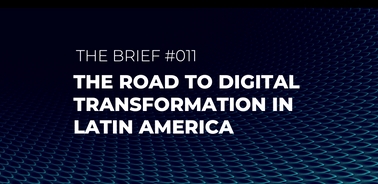- Home
- News And Events
- News
- The Brief #011 The Road To Digital Transformation In Latin America
THE BRIEF #011 The Road to Digital Transformation in Latin America

IN BRIEF
Latin America faces a growing paradox: while private sector digital transformation accelerates, governments struggle to keep pace. This widening gap prevents the adoption of technological solutions that could transform essential public services, particularly for the region’s most vulnerable populations, who stand to benefit most from these innovations.
THE GIST
Three converging forces — rapid social change, economic pressures, and technological advancement — are reshaping how citizens expect governments to make decisions and deliver services. They must now deliver services with private-sector efficiency, operating under severe budget constraints and addressing challenges such as aging populations, environmental degradation, housing crises, and workforce transformation — all while maintaining public trust.
Governments continue to underutilize emerging technologies, even as the private sector demonstrates their potential. Persistent barriers remain: outdated procurement systems favor established vendors over startups, cultural divides separate bureaucratic and entrepreneurial mindsets, and many civil servants lack the training needed to manage modern technology projects. This innovation stagnation creates a double disadvantage: vulnerable communities miss out on life-improving solutions while governments remain trapped in cycles of inefficient service delivery.
However, some cities in Latin America are breaking this pattern. The district of Vitacura in Santiago (Chile) was facing a pressing environmental challenge: vast amounts of water was being wasted on public urban-green areas due to inefficient irrigation systems and lack of real-time data. In response, the city partnered with Govtech LATAM to launch an open innovation challenge, aiming to pilot a smart irrigation system powered by sensors and data analytics. By enabling precise monitoring of soil moisture and weather conditions, the solution resulted in more efficient water use.
In Maceió (Brazil), the public administration sought to promote pilot projects for mobility. With over 2,000 new vehicles registered every month, frequent traffic congestion in over 40 critical points, and a lack of real-time data, the city was undergoing a severe urban mobility challenge. Through the open innovation challenge held by GovTech LATAM, 18 solutions were identified to address the issue, by using drones, cameras, AI, and automated learning systems.
While the cases of Santiago and Maceió are just examples, they offer broader insights into the Govtech LATAM initiative (2022–2025), a joint effort by the Center for the Governance of Change at IE University and IDB Lab. The project worked with Latin American 10 cities and hundreds of startups and government officials to prove technology’s potential to address operational inefficiencies and systemic governance challenges. Its work revealed that the Open Innovation model adapted from Govtechlab Madrid can indeed be effective in Latin American contexts when properly localized.
THE TAKEAWAY
Three key insights emerged from applying an Open Innovation methodology across Latin American municipalities:
True innovation requires cultural transformation. Effective solutions emerge from fundamentally reimagining processes and workflows through collaborative design that engages both problem-owners and solution-developers from the outset.
User validation is essential. Early and continuous engagement with end-users significantly improves solution adoption rates and long-term effectiveness.
Pilot projects deliver value beyond their immediate problem-solving. They serve as powerful change agents that can reshape organizational cultures, break down institutional silos, and establish new norms for more flexible, strategic public procurement.
The GovTech LATAM initiative confirmed that successful public-private collaboration hinges on committed political leadership, agile implementation methodologies, and robust regional knowledge networks.
DELVE DEEPER
- GovTech Lab: Digital transformation of local governments through emerging digital solutions. CAF (2024). https://www.caf.com/es/especiales/govtech-lab-caf/
- GovTech LATAM program. Inter-American Development Bank (2025). https://www.iadb.org/es/proyecto/RG-T3819
- The global public impact of GovTech. World Economic Forum (2023). https://www.weforum.org/publications/the-global-public-impact-of-govtech/